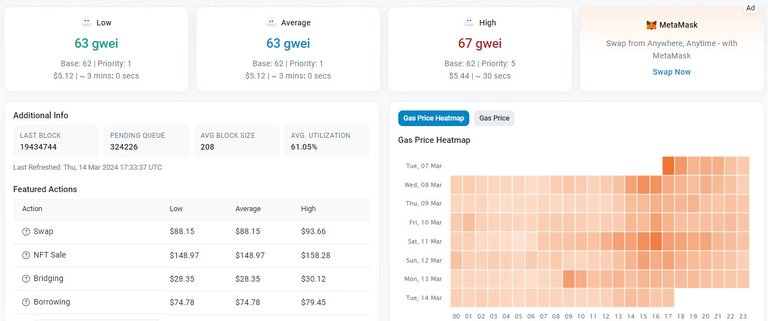
Big news hit Ethereum just a few days ago as the upgrade for Ethereum went live called Dencun. The general marketing and consensus of this upgrade was to reduce fees on the Ethereum blockchain. While that's true in a way I feel like it's not exactly what people were thinking. So let's take a moment and dive into Ethereum, this upgrade,
Before Duncan went live we started to see Ethereum fees starting to climb. I remember a friend of mine paying around $7.50 for a transaction but the average came in around $5.50. Now it also depends on what your transacting over the network such as large files can have a much higher fee associated with it.
At the moment of writing this a quick snapshot shows us currently sitting at the following numbers.

The main release of EIP-4844 with Dencun was suppose to reduce these fees right?
Well kind of...
Rollups and Layer 2's
Rollups of zk rollups are something pretty new to the ecosystem. The idea is to bundle up transactions from a layer 2 blockchain and then broadcast them in bulk to the main Ethereum chain. Thus more transactions can take place at a lower fee on a layer two solution while still promising to have that data stored onto the Ethereum mainnet.
What Dencun does is allocates a new pathway for these roll up transactions to take place and allow them to broadcast to the chain at a reduced rate. Thus proving that Ethereum is mainly focused on layer 2 options taking the brunt of the weight and broadcasting that data on to the main chain.
This in theory is just like sharding where you have multiple nodes that don't house all of the data but just enough and parts of it to interact with their smaller ecosystems, bundle those transactions and then broadcast.
Other layer two options that continue to expand and bring new innovation of their own such as zkSync, Arbitrum, Optimism and Base have seen growth on their changes which then interact with Ethereums main chain.
The idea here is to spread that data across layer twos and then have the layer 2's interact with the main chain. Not that each person should interact with the chain itself like we have seen in the past.
A $150 fee for a single NFT doesn't need to be taking place. Instead trading it on Polygon for example would be far cheaper as it would then be bundled up and broadcasted to the Ethereum chain itself.
This screenshot from IntoTheBlock clearly shows the change that took place.

No Single Blockchain Can Do it All
I understand that everyone feels like they should be interact with Ethereum directly for all transactions but the simple matter of it is it's impossible for one single blockchain to do it all. At least for now, the tech, the bandwidth and the storage space just isn't there. If a single chain where to try and do it all it would price out everyone but mega corps that could afford to download massive blockchain data to run a node.
You're every day computer and hard drive just wouldn't cut it and that's something Ethereum is trying to get better at. Reducing the size of the chain and making it more light weight should increase decentralized as it would be easier to run a node yourself at any given time.
Posted Using InLeo Alpha








